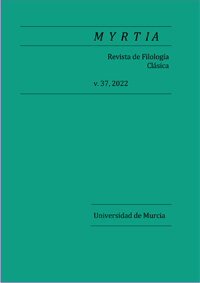El Perjurio en la Antigüedad Clásica
Resumen
El presente análisis examina los desarrollos diacrónicos de las actitudes sociales con respecto a los juramentos en el contexto griego antiguo, desde los poemas de Homero y Hesíodo, pasando por los relatos de Heródoto y Tucídides, hasta el período posterior a la Guerra del Peloponeso. Su enfoque principal se asienta en un análisis más sincrónico del período inestable narrado por Jenofonte, principalmente en su Helénica, pero también teniendo en cuenta otras fuentes. Las conclusiones extraídas de esta indagación deben entenderse en el contexto general de finales del siglo V y principios del IV a. e. c. y ayudan a explicar la incertidumbre política de este período. Las dudas sobre la capacidad de los dioses para castigar a los perjuros (pese a las opiniones religiosas del propio Jenofonte) y, por tanto, el cuestionamiento de la eficacia de los juramentos como institución coordinadora de las interrelaciones entre las poleis griegas no son sólo causas de la inestabilidad de este pero también sus resultados.
Descargas
-
Resumen1012
-
PDF 563
Citas
Demosthenes, 1939, Demosthenes with an English translation by A.T. Murray, Cambridge/ London.
Herodotus, 1920, Histories. With an English translation by A.D. Godley, Cambridge.
Hesiod, 1914, Theogony, in: The Homeric Hymns and Homerica with an English Translation by H.G. Evelyn-White, Cambridge/ London.
Hesiod, 1914, Works and Days, in: Hesiod. The Homeric Hymns and Homerica with an English Translation by H.G. Evelyn-White, Cambridge/ London.
Homer, 1924. The Iliad. With an English Translation by A.T. Murray, Ph.D. in two volumes, Cambridge/ London.
Isocrates, 1980, Isocrates with an English Translation in three volumes. Trans. by G. Norlin, Cambridge/ London.
Plato, 1997, Laws. Trans. by T.J. Saunders, in: Plato: Complete Works. Edited, with introduction and notes, by J.M. Cooper; associated editor, D.S. Hutchinson, Indianapolis/ Cambridge, 1318-1616.
Plato, 1997, Republic. Trans. by G.M.A. Grube, rev. C.D.C. Reeve, in: Plato: Complete Works. Edited, with introduction and notes, by J.M. Cooper; associated editor, D.S. Hutchinson, Indianapolis/ Cambridge, 971-1223.
Thucydides, 1910, The Peloponnesian War. Trans. by J.M. Dent, London/ New York.
Xenophon, 1925, Agesilaus. Trans. by E.C. Marchant, in: Xenophon: Xenophon in Seven Volumes, 7. Ed. by E.C. Marchant and G.W. Bowersock, Cambridge/ London.
Xenophon, 1922, Anabasis. Trans. by C.L. Brownson, in: Xenophon: Xenophon in Seven Volumes, 3. Ed. by C.L. Brownson, Cambridge/ London.
Xenophon, 1925, Constitution of the Lacedaimonians. Trans. by E.C. Marchant, in: Xenophon: Xenophon in Seven Volumes, 7. Ed. by E.C. Marchant and G.W. Bowersock, Cambridge/ London.
Xenophon, 1914, Cyropaedia. Trans. by W. Miller, in: Xenophon: Xenophon in Seven Volumes, 5 and 6. Ed. by W. Miller, Cambridge/ London.
Xenophon, 1918-1925, Hellenica. Trans. by C.L. Brownson, in: Xenophon: Xenophon in Seven Volumes, 1 and 2. Ed. by C.L. Brownson, Cambridge/ London.
Xenophon, 1923, Memorabilia. Trans. by E.C. Marchant, in: Xenophon: Xenophon in Seven Volumes, 4. Ed. by E.C. Marchant, Cambridge/ London.
Xenophon, 1923, Symposium. Trans. by O.J. Todd, in: Xenophon: Xenophon in Seven Volumes, 4. Ed. by O.J. Todd, Cambridge/ London.
Secondary Literature
E. Badian, 2004, Xenophon the Athenian, en Xenophon and his World, C. Tuplin (ed.), Stuttgart, pp. 33-54.
E. Baltrusch, 1994, Symmachie und Spondai. Untersuchungen zum griechischen Völkerrecht der archaischen und klassischen Zeit (8. – 5. Jahrhundert v. Chr.), Berlin/ New York.
É. Benveniste, 1969, Le vocabulaire des institutions indo-européennes. 2. Pouvoir, droit, réligion, Paris.
D.L. Berkey, 2001, The struggle for hegemony. Greek interstate politics and foreign policy, 404-371 B.C., New Haven.
J. Bloxham, 2018, Ancient Greece and American Conservatism. Classical Influence on the Modern Right, London/ New York.
S. Bolmarcich, 2007, Oaths in Greek international relations, en Horkos. The Oath in Greek Society, A. Sommerstein and J. Fletcher (eds.), Exeter, pp. 26-38.
H. Bowden, 1999, Xenophon and the Scientific Study of Religion, en Xenophon and his World, C. Tuplin (ed.), Stuttgart, pp. 229-246.
G.L. Cawkwell, 1981, The King’s Peace, CQ 31, 1, pp. 69-83.
J. Derrida, 2002, Le parjure, peut-être. (« brusques sautes de syntaxe »), Études Françaises 38, 1-2, pp. 15-57.
J. Dillery, 1995, Xenophon and the history of his times, London.
K.J. Dover, 1974, Greek popular morality in the time of Plato and Aristotle, Oxford.
D.L. Gera, 1993, Xenophon’s Cyropaedia. Style, Genre and Literary Technique, Oxford.
G. Glotz, 1904, La solidarité de la famille dans le droit criminel en Grèce, Paris.
V. Gray, 1989, The character of Xenophon’s Hellenica, London.
F. Hartog, 2001, Le miroir d’Hérodote. Essai sur la représentation de l’autre, Paris.
S. Hornblower, 2007, Thucydides and Plataian perjury, en Horkos. The Oath in Greek Society, A. Sommerstein and J. Fletcher (eds.), Exeter, pp. 138-147.
R. Janko, 1994, The Iliad, a commentary. Volume IV: books 13-16, Cambridge.
M. Jehne, 1994, Koine Eirene. Untersuchungen zu den Befriedungs- und Stabilisierungsbemühungen in der Griechischen Poliswelt des 4. Jahrhunderts v. Chr., Stuttgart.
H. Kleinknecht, 1940, Herodot und Athen, VII 139/ VIII 140-144, Hermes 75, pp. 241-264.
K. Meister, 1990, Die griechische Geschichtsschreibung. Von den Anfängen bis zum Ende des Hellenismus, Stutgart/ Berlin/ Köln.
J.D. Mikalson, 2004, Athenian Popular Religion, Chapel Hill/ London.
R. Parker, 2004, Athenian religion. A history, Oxford.
F.S. Pownall, 1998, Condemnation of the Impious in Xenophon’s Hellenica, The Harvard Theological Review 91, 3, pp. 251-277.
T.T.B. Ryder, 1965, Koine Eirene. General Peace and Local Independence in Ancient Greece, London.
E.M. Soulis, 1972, Xenophon and Thucydides. A study on the historical methods of Xenophon in the Hellenica with special reference to the influence of Thucydides, Athens.
L. Strauss, 1939, The Spirit of Sparta or the Taste of Xenophon, Social Research 6, 1, pp. 502-536.
L. Strauss, 1983, Studies in Platonic Political Philosophy, London.
C. Tuplin, 1993, The failings of empire. A reading of Xenophon Hellenica 2.3.11 – 7.5.27, Stuttgart.
S. Usher, 1962, Xenophon and his times, History Today 12, 7, pp. 496-505.
P. Veyne, 1983, Les Grecs ont-ils cru à leurs mythes? Essai sur l’imagination constituante, Paris.
K.-W. Welwei, 2004, Sparta. Aufstieg und Niedergang einer antiken Großmacht, Stuttgart.
Las obras que se publican en esta revista están sujetas a los siguientes términos:
1. El Servicio de Publicaciones de la Universidad de Murcia (la editorial) conserva los derechos patrimoniales (copyright) de las obras publicadas, y favorece y permite la reutilización de las mismas bajo la licencia de uso indicada en el punto 2.
2. Las obras se publican en la edición electrónica de la revista bajo una licencia Creative Commons Reconocimiento-NoComercial-SinObraDerivada 3.0 España (texto legal). Se pueden copiar, usar, difundir, transmitir y exponer públicamente, siempre que: i) se cite la autoría y la fuente original de su publicación (revista, editorial y URL de la obra); ii) no se usen para fines comerciales; iii) se mencione la existencia y especificaciones de esta licencia de uso.
3. Condiciones de auto-archivo. Se permite y se anima a los autores a difundir electrónicamente las versiones pre-print (versión antes de ser evaluada) y/o post-print (versión evaluada y aceptada para su publicación) de sus obras antes de su publicación, ya que favorece su circulación y difusión más temprana y con ello un posible aumento en su citación y alcance entre la comunidad académica. Color RoMEO: verde.






